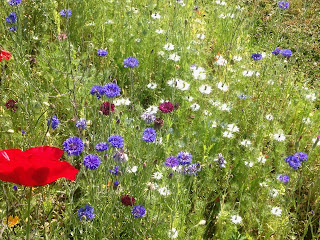The most astonishing thing about this long hot summer is how well the rest of the natural world has survived, compared to us. How puny we have become in our First World complacency, struggling to maintain water levels, while the native plants and trees around us grow and reproduce regardless.
As I look in wonder at their resilience I find comfort and reassurance. Evidently this kind of summer has been occurring in Ireland for centuries, otherwise local flora would perish.
Yes, your lawn is brown and your pot plants need help, because they are our artificial interpretations of the natural world.
There’s barely been a drop of rain for months, yet the willow still grows, below ground, as its extensive root systems endlessly seek out water. Wild roses love a drought, feeding our eyes with pink flourishes cascading over hedges and stone walls.
Thistles, meadowsweet, willow herb and dandelion carry on unperturbed by lack of water, while the cow parsley and all forms of wild carrot seem to be thriving, offering delicate white umbrellas and domes that catch your eye in a breeze.
Some trees have clearly put early energy into fruiting. Having evolved to ensure the perpetuation of their species, when the rain disappears they react, apparently cutting back on trunk and leaf growth, while pumping up production of the next generation.
Two weeks ago I saw towering horse chestnut trees already laden with conkers, while the branches of holly trees are dangling under the weight of clumps of green berries.
The bracken has taken a bit of hit, browning and collapsing along the roadsides, but just above, on the bramble bushes, a plethora of delicate pinky-white flowers promise a rich harvest of blackberries this Autumn.
Would that were the case for the raspberries in the garden. The burst of flowers in Spring promised a bumper harvest, and then fruit started to form, grew into perfect plump raspberry forms only to turn brown, crisping into what I can only describe as raspnuts.
I could have saved them, had I watered them, but it didn’t feel like a responsible reaction. All around me other plants, flowers and shrubs are doing just fine, without a drop of rainfall’s aid. The fuchsia, forsythia and perennial sweet peas are flourishing, while the poppies, corncockles, nigella and cornflowers are in their element.
At the height of heatwave I spent a week in North Mayo, in a house up a hill and beyond a while. Daytime temperatures were around 30°c and on the third day of my stay, the well ran dry.
The following four days proved a shocking education for me, as I discovered how much water I use, even when I’m really trying to conserve it.
Taking no showers, using the remains of the kettle to do the dishes and living by the old hippy adage of If it’s yellow let in mellow, if it’s brown flush it down, I quickly discovered my utter reliance on the tap; the useless empty tap that I turned on out of pure habit god knows how many times, even though I knew there was no water.
I love water. At home I have a pint glass of water beside me day and night, and if I’m out I’ll have a bottle of it with me. After a lifetime of turning on a tap to fill my glass with drinking water it proved instructive to know how it felt when no water poured forth.
Took a while to sink in though. Sometimes I’m not the fastest, but I get there in the end.
Using only what I felt was the absolute bare minimum, I started to disappear under a mountain of empty 5 litre water containers. By the time they formed a pyramid any pharaoh would be proud of, I was having nightmares about marine life and that area of plastic junk in the Pacific that’s bigger than Spain and France combined, so I took the old ones into the village and refilled them at the garage.
To be honest I was plain disgusted with how much water I needed, and after taking a wondrous shower at a friend’s house I watched slightly covetously as they used their taps with nary a care.
Thankfully I have travelled, so I’ve been to places where women are expected to walk for miles to collect water every day. After seeing that I always gave thanks in a tacit way for having running water, but now I feel extravagantly lucky, and so should you.
Now take a deep breath and sit through the bit where you get hit with lists of statistics. Hold that breath and stick with it this time though, because these aren’t stats about obesity or the dangers of smoking: this is about the stuff of life, and why you should appreciate the wonderful liquid coming out of your tap.
The average tap releases 2 gallons of water per minute, which is roughly what a resident of sub-Saharan Africa uses each day.
Here in the EU we each use about 50 gallons of water a day, while in the USA they go through 100 gallons a day.
A five-minute shower uses 10 to 25 gallons, while at one drip per second, a leaking tap wastes 3,000 gallons a year.
Before you start moaning about a hosepipe ban, spare a thought for those 844 million people who don’t have clean water, and the 2.3 billion people who don't have a decent toilet.
Consider the fact that every minute a newborn dies from infection caused by lack of safe water, and then look around, enjoy the plants that still stand proud, and give thanks for the water coming from your tap.
©Charlie Adley
19.07.2018.










